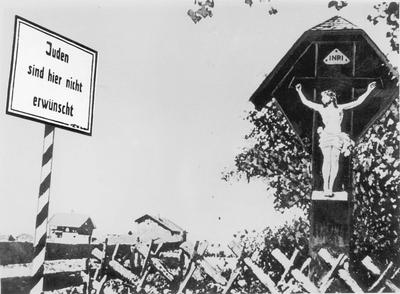How to cite this article: R. Steven Notley, “The Cross and the Jewish People,” Jerusalem Perspective (2003) [https://www.jerusalemperspective.com/6275/].

One of the most poignant pictures which exemplify the chasm of historical misunderstanding between Jews and Christians is that found in Yad Vashem, the Holocaust memorial in Jerusalem. It is a photograph of a life-size crucifix that stood outside an unknown German village prior to World War II. In a twist of tragic irony a sign was hung on the cross to warn Jews not to enter the village. It read: “Jews are not welcome here.” Yet, the specter of the lonely figure of Jesus—himself a Jew—hanging on a cross together with such an expression of bigotry and written even by those called by his name, leaves the casual observer struck by the degree of historical distortion which has evolved over two millennia.
The irony is that Jesus was crucified by Pontius Pilate precisely because he was a Jew. Crucifixion was a common form of Roman suppression used against individuals and movements which the empire considered threatening. The Roman prefect Quintilius Varus put down the Jewish insurrection at the time of Herod’s death by crucifying two thousand Jews on the roads leading to Jerusalem (Josephus, Jewish War 2:74-76). Seventy years later, when Titus besieged Jerusalem, many tried to escape because of hunger. All those captured were scourged and crucified. Josephus relates that there were up to 500 a day. In fact, so many Jews were crucified by the Romans during the destruction of Jerusalem that they did not have sufficient space and ran out of crosses (Jewish War 5.446-451).
Paid Content
Premium Members and Friends of JP must be logged in to access this content: Login
If you do not have a paid subscription, please consider registering as a Premium Member starting at $10/month (paid monthly) or only $5/month (paid annually): Register
One Time Purchase Rather Than Membership
Rather than purchasing a membership subscription, you may purchase access to this single page for $1.99 USD. To purchase access we strongly encourage users to first register for a free account with JP (Register), which will make the process of accessing your purchase much simpler. Once you have registered you may login and purchase access to this page at this link:
































































































Comments 1
So if Jesus was crucified because he was a Jew, is there no theological importance to His death? Did it not accomplish anything? Was it just one more tragic death of a Jew by crucifixion? What does Jesus’ death mean to you?
Were they not Jews who cried out, “Crucify Him!”? Granted, the Romans executed Him, but they asked the people first what they thought should be done with Christ. Even Pilate thought He was innocent.
I hope you will respond, as I see most questions asked here are not given a response by the authors or site admin. Thank you.